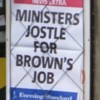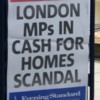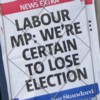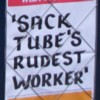We are developing the social individualist meta-context for the future. From the very serious to the extremely frivolous... lets see what is on the mind of the Samizdata people.
Samizdata, derived from Samizdat /n. - a system of clandestine publication of banned literature in the USSR [Russ.,= self-publishing house]
|
The weather is cold and snowy in Britain just now – even, now, in central London – but people like Richard North are actually quite enjoying this:
It is global warming here again, and it is getting serious. It is not so much the depth, as the repeated falls. Each layer compacts and freezes which, with fresh global warming on top becomes lethally slippery.
Time was, what with the AGW crowd pretty much completely controlling the agenda, when this kind of elegant mockery would be dismissed as the ignorance of the uninitiated. But the fact is that the present wintry weather is extremely significant in this debate. True, the weather today is not the climate for the next century, but sooner or later weather does turn into climate, and the weather has, from the AGW point of view, been misbehaving for a decade. Their precious Hockey Stick said that the temperature of the globe would disappear off the top right hand corner of the page, right about now. Well it hasn’t, has it?
As John Redwood recently asked Ed Miliband in the House of Commons, concerning the present very cold weather:
… which of the climate models had predicted this?
None, it quickly became clear from Mr Miliband’s faltering reply, that Mr Miliband has been paying any attention to (although other sorts of models have predicted cold winters rather successfully).
But this is not just about looking out of the window and seeing if global warming is to be observed or not (as Richard North well understands). The other point here is the authority of the people upon whom people like Ed Miliband have been relying. Not only have none of Miliband’s “experts” (sneer quotes entirely deliberate) been able to predict the recent succession of colder winters; it goes way beyond that. The point is: these experts assured the world, or allowed their more ignorant followers to assure the world, that these cold winters would not happen, and despite all their protestations now about how weather is not climate, well, shouldn’t they have born this in mind when saying, only a few short years ago, and repeating ever since, that winter snow in places like Britain would be a thing of the past? Should they not have been more careful about seizing upon any bursts of warm weather, any bursts of weather of any kind, come to that, as evidence of the truth of global warming? Had they truly understood the point that they have been reduced to making now, they would have been a lot more modest in their recent, and in Britain economically disastrous, medium range predictions. See also, John Redwood’s follow up posting. Redwood is now talking more sense about the world’s climate than the British Met Office. → Continue reading: Cold wars
I thought this might interest and rile up some of our readers, many of whom I expect are as great fans of Michael Yon as I am:
Got arrested at the Seattle airport for refusing to say how much money I make. (The uniformed ones say I was not “arrested”, but they definitely handcuffed me.) Their videos and audios should show that I was polite, but simply refused questions that had nothing to do with national security. Port authority police eve…ntually came — they were professionals — and rescued me from the border bullies.
He was not at all pleased by the treatment and has written:
When they handcuffed me, I said that no country has ever treated me so badly. Not China. Not Vietnam. Not Afghanistan. Definitely not Singapore or India or Nepal or Germany, not Brunei, not Indonesia, or Malaysia, or Kuwait or Qatar or United Arab Emirates. No county has treated me with the disrespect can that can be expected from our border bullies.
When, I ask you, are we going to FIRE these un-american, untrained, brainless, worthless, useless apes? (I beg forgiveness if I offend any of our near relatives by use of this comparison. Great Apes are marvelous creatures.) Of course, they might have to go on welfare if we fired them because no one but a government bureaucracy would be stupid enough to hire people whose only contribution to America will be their retirement.
Mad? You are damned right I am mad. The TSA and INS are out of control. Disband it. Fire them all. NOW, DAMN IT!!!
New info from Yon in addition to the above on FB: “The Customs people (CBP) were the actors who handcuffed me.”
As Michael Jennings has already reminded us, it is now that time of year, when we look back at the rest of the year. I too will now look back at 2009. Whereas Michael trots the globe, my preferred outdoor activity is walking around London, taking photos, an activity which, as of now, remains more or less legal.
And one of the things I especially like to photo is Evening Standard headlines. Not the headlines in the actual newspaper itself, but the ones on the outside of the contraptions behind which the sellers of the Evening Standard sit. I don’t do this as obsessively as this guy, but I do it every few days or so, whenever a particularly intriguing or doom-laden headline hoves into view.
Click on all these headlines to get the original picture that I took, often a bit prosaic, as in: just the headline and its immediate surroundings; but sometimes with further fun and games, in particular further headlines next to the one I’ve featured in the little squares below. So, for instance, to consider just the first two snaps, on Jan 5, besides the amazing news that it was quite cold in January 2009 (just as it is quite cold now – see Dec 22(a)) you can also see talk of “TORY TAX CUTS”. We wish. Still in January, you can ponder the ever widening gap that separates the ever more bogus hero Barack Obama from the real deal: “CAPTAIN COOL IN RIVER JET CRASH”.
The most regular themes are: economic woe, politicians cheating on their expenses, the consequent relentless criticism of and plotting against the Prime Minister, and the equally relentless way the Prime Minister just bashes on with his ruinous activities, seemingly impervious to all complaints.
See especially June 5, which is worth clicking on for, I humbly submit, artistic reasons This is certainly my favourite photo of all these, in terms of the atmosphere it evokes and the memories it will stir in me in future years, one of the main reasons I take photos being just remind myself of what I was interested in, whenever it was. I love that digital cameras automatically attach dates to everything. So, here we go.
There are three for July, because none of the three headlines you see seemed to me to deserve exclusion.
January 5, 20 – February 11, 19:
   
March 19, 23 – April 15, 24:
   
May 2, 5 – June 5, 24:
   
July 10, 21, 31 – August 11, 26:
  
 
September 8, 10 – October 8, 20:
   
November 17, 19 – December 22, 22:
   
Well, I hope you liked all that, even if without a lot of clicking.
You may now be saying to yourself that November and December have become pretty anti-climactic, and you would be right. For there is another story here, besides all the stories alluded to in the headlines. These photos serve not just as a random walk through the year 2009, but as a probable elegy for the Evening Standard itself, and certainly for the long London era of Evening Standard headlines in the streets.
Click on October 20 for the first clue. That’s right. Some time around then, the Evening Standard stopped costing any money, and started being handed out free. At first the guys giving it away carried on with the billboards, but I knew that this practice would soon fade away. If no money is being made in the street from these newspapers, why go to all the bother of advertising them in the street. So it is that if you click on the last picture of all, you see that where there used to be informatively alarming stories about doom and disaster, now there are only forlorn signs saying that the ES now costs nothing.
This switch to the ES being a giveaway came only a few months after its takeover by a Russian Oligarch. How soon before the ES vanishes altogether, becoming itself the subject of a few more doom-laden headlines in other organs, before it sinks from the memory of Londoners?
Richard Castle of the Burton Mail wrote the following story about a recent act of vandalism: Vandals deface the town war memorial :
A ROYAL British Legion boss says vandals have “dishonoured those who have given their lives for our country” by defacing Burtonʼs war memorial.
Roy Whenman, vice-chairman of the town’s Legion branch, received calls from members saying an extremist message had been written on the statue. Having been informed at 9.20am, borough council chiefs had cleaned the graffiti from the relic, situated outside Burton College, in Lichfield Street, by 9.40am.
Mr Whenman, of Birches Close, Stretton, has described whoever committed the offence as “diabolical”.
He said: “There’s nothing worse, in my eyes, than discrediting a war memorial. It dishonours those who have given their lives for our country.
“I don’t know how long it was there for, but I was pleasantly surprised by the council’s quick action and I commend them for it.
“What I would say to them is there are other ways of expressing your anger about certain issues.”
Dennis Fletcher, chairman of East Staffordshire Racial Equality Council, said he suspected someone from the far right was responsible.
He said: “My reaction is one of horror. Just two nights ago at our general committee meeting we were talking about the harmony between communities in the borough.
“I suspect members of the far right have done this to stir things up and there are generally very good inter-cultural relations in East Staffordshire.
“Graffiti of any type is terrible but when it includes racist material it has to be considered utterly unacceptable.”
An East Staffordshire Borough Council spokesman said: “We would say that this vandalism is deplorable and we do our best to clean such graffiti as soon as we possibly can.”
â– The Mail has manipulated the mainpicture to remove some of the content of the message.
The Burton Mail would like you to think that what was removed in the manipulation was swear words or something like that.
Actually, no. A picture of the graffiti has been posted by “OldWarDog” of the “4 Freedoms Worldwide” blog. It shows that the censored words were…
…Before I tell you, see if you can guess. Not the exact words, but the general idea. You can make a guess based on this gnomic comment from the vice-chairman of the Burton branch of the British Legion: “What I would say to them is there are other ways of expressing your anger about certain issues.” (What issues? Why are you talking in this strange, indirect way?) You can make a guess from the otherwise inexplicable involvement of the chairman of East Staffordshire Racial Equality Council, and his guess – unsupported by any evidence – that “someone from the far right was responsible”, when the British Far Right are usually all too anxious to muscle in on displays of support for the armed services. You can make a guess from his further comment, which only starts to make sense when you realise that something is being hidden, that “Just two nights ago … we were talking about the harmony between communities in the borough.”
Did you get it? Here is the picture.
And in case that link goes dead, let me just tell you. The graffiti says “Islam will dominate the world. Osama…” The next few words are difficult to read in the picture. Never mind, you guessed the general thrust of them anyway.
Now read Kathy Shaidle’s post :When media bias becomes media malpractice.
What is the Burton Mail playing at? I was about to write, “you can’t get away with that sort of thing now we have the internet” until half a second’s more thought told me that you couldn’t get away with that sort of thing in the days before the internet either. Hundreds of people in Burton must have seen the graffiti, even if it was removed quickly by the council. When even one or two of these hundreds saw that report in the Burton Mail they will have instantly realised they were being lied to, and will have become far more likely to spread the news about what they really saw. The graffiti on its own will do harm to race relations. The graffiti plus the cover up will do far worse.
(Via House of Dumb)
Within a few seconds of cranking up my computer this morning I was reading this posting by Steve McIntyre, which I got to via Bishop Hill, who says of it:
McIntyre has posted his first analysis of some of the emails. It’s not looking good for the Hockey Team, with their scheming to remove the divergence problem and “hide the decline” from the IPCC reports laid out in horrifying detail.
There are going to be months of revelations like this.
So that’s two links to the McIntyre posting in this already. The internet already contains a lot more. Watch it go viral, much as this just did.
A commenter on McIntyre’s posting, Jonathan Fischoff, says:
Every time I hear people say “the emails are out of context!” I think, be careful what you wish for.
Chris S says:
People are now beginning to realize how “so much was owed by so many” IPCC Summaries, “to so few”.
Indeed.
What of Al Gore‘s other argument (beside the taken-out-of-context argument), that all these CRU emails are ten year’s old, so, really, what the flip? As thousands have already pointed out, many of the CRU emails, which Gore has clearly not read or even read very much about, are far more recent. But yes indeed, the emails scrutinised in this latest McIntyre posting do indeed go back a decade. But what that shows is: so does the scientific dishonesty. Gore is saying: “Relax, it goes back a long way, these guys have been conning us for a decade.” This doesn’t really work as a put-down, does it?
Will “the media” give this McIntyre posting the attention it deserves? I am increasingly thinking that it doesn’t matter what these people say or don’t say about this story, or about anything else. McIntyre’s posting, one of the many fragments of this far bigger mega-story, is now out there, for anyone with internet access who wants to read it, and read about it. Tens of thousands of comments on it, attached directly to it, and such as this one that you are reading now, are even now being concocted, by and for all who care. Whether the old-school journos join in (Delingpole is a good example of that trend) and thereby become part of the new media, or prefer to keep looking away (see Delingpole’s excellent recent posting about the pathetic Climategate non-performance so far of Private Eye) this says more about their own future than it says about the story itself. As with the named and shamed CRU scientists, the exact motivation behind each particular item of old-school media deception, neglect or misdirection is a matter of debate. The fact of it is not, and any who want to can now see this.
Michael J just emailed me this link to a piece by a scientist. The point is, guys like this can now can now say all this. He no longer needs any journo to open the door for him.
Bishop Hill, who has been working overtime to keep apace with the whole University of East Anglia climate change kerfuffle, has this remarkable example of how some journalists have been threatened by AGW alarmists. How lovely.
By the way, as a native of East Anglia, I feel ashamed of how my region has been tainted by these arseholes. When the UEA was originally built back in the 1960s, it was constructed, much to my father’s chagrin, on a golf course. Given the collapse in that institution’s reputation as a result of the emails, perhaps it should revert to golf and do less harm to what remains of the UK’s intellectual life.
So when Peter Mansbridge went on the National tonight to admit what he had surely known for days, we didn’t watch to find out what’s contained in FOIA 2009.zip, for we’d read it for ourselves.
We only watched to see if he had.
For perhaps the first time in the history of mass media, the gatekeepers broke a major scandal to an audience fully 10 days ahead of them.
– Small Dead Animals describes how the mass media of Canada finally got around to noticing Climategate. Thank you Counting Cats.
Last night I channel hopped into Question Time, the BBC’s late night political panel show, and caught the beginning of the question they had about climate, etc.. And I can report that, although maybe only temporarily, there has been, I think, a definite change of atmosphere in the argument about climate change.
Melanie Phillips and Marcus Brigstocke said, respectively, yes and no, to the question about whether global warming was a scam. Neither Brigstocke nor Phillips said anything I haven’t heard either say several times before. Brigstocke made much of the fact that the articles he agrees with about melting icecaps were all “peer reviewed”, which Melanie Phillips wasn’t able to come back on, as she was surely itching to do. But Brigstocke wasn’t the sneering, jeering, arrogant shit I’m used to. Melanie Phillips was heard reasonably politely, and the general tone of the event was thoughtful and hesitant rather than dogmatic and intolerant of dissent. David Davis made a point of criticising the use of the word “denier” to describe people who might disagree with you. Science, he said, can’t work like that. Science is never settled, he said. Nobody objected to those claims in any way.
But it wasn’t so much what they all said. It was more how they said it, and the general atmosphere of how it was received. The audience was the usual pro-warming crowd, but its partisanship was not the monstrous thing I usually see on Question Time, and it included at least two brave souls who thought quite differently, because they said so out loud. First, there was the questioner, who dared to use that word: scam. And at the end there was a bloke who claimed, mentioning those familiar (to us lot) historical stories about the medieval warm period, that “only one point of view is allowed”. But as he himself proved, both by how he spoke and by how he was allowed by all others present to speak, i.e. without jeeringly self-righteous interruptions, that he was a bit out of date.
Put it this way. A mere wordsmith like me struggles to get across what the change was. But a theatre or movie director would have known at once that something quite big had happened, and would have been able to itemise quite a few more specifics to back up that observation than I can, to do with body language, tone of voice, crowd noises, and so on and so forth. I hesitate to say that “things will never be the same again”. But I do think this might now be true.
Listening to Brigstocke talking about the problems he said the Inuits have been having, and about retreating icecaps and water that is less saline than usual because of so much ice melting into it, made it clear to me that the question now is: How much evidence is there, still, for the global warming thesis, that has not been taken out, not contaminated (so to speak) by those wretched CRU conspirators. (Later: in connection with that, see this. Even later: I’m not completely sure, but I rather think this may be one of the very best pieces yet on all of this. And whatever you do, don’t miss the final paragraphs about all those bewildered environmental correspondents. Real Samizdata quote of the year stuff.) → Continue reading: Question Time and questioning the Times – how the climate of opinion has changed
Rupert Murdoch is not a stupid chap, but I cannot understand how he can fail to see the absurdity of his latest remarks. His threat to block his online content from search engines is an indication he does not grasp the fact his content is almost entirely fungible in a world where the plentiful alternatives are simply a click away.
Rupert Murdoch says he will remove stories from Google’s search index as a way to encourage people to pay for content online.
Let me correct that…
Rupert Murdoch says he will remove stories from Google’s search index as a way to encourage people to find alternative content elsewhere online.
Not only will people not be motivated to pay Rupert Murdoch for content if they cannot find it via google, they will not even be aware of the content Murdoch is hiding from them. In short, Murdoch will become completely irreverent irrelevant on-line almost overnight and I am not sure why he thinks all too many people will care one way or the other. This is a bit like threatening someone that if they do not give him their money, Murdoch will cut his own throat. Er, sure Rupert, whatever. I suspect folks at the Guardian (who may not be my favourites ideologically but they certainly ‘get’ the internet better than most) and elsewhere can hardly believe their good luck.
Sorry to obsess on the subject but I just keep seeing these howlers by the professional journalists who we are told are so essential for democracy/social justice/world rotation/whatever. The latest giggler comes from Ed Pilkington writing in the Guardian:
There is also evidence that Hasan purchased a high-powered pistol three weeks ago as well as several high-capacity ammunition rounds that would allow him to continue firing without reloading.
Well… a 5.7mm pistol round is kind of low-powered really, at least in terms of ‘stopping power’ and I suspect the main reason that traitorous Muslim creep at Fort Hood killed so many people was they were defenceless and thus died from multiple point blank shots… therefore I can well believe he purchased several high-capacity magazines… you know, the sticky-down bits that hold the “ammunition rounds” (presumably as opposed to “newspaper rounds” or “doctor’s rounds”)… hehehe…. and I assume he got several so that he could reload quickly during his shooting spree.
It seems a crime reporter writing for a ‘quality newspaper’ does not need to know even the most rudimentary technical terms when describing a firearm used in a crime. The fact the editor of the Guardian lets a journalist make a ass of himself writing about something they obviously both know nothing about tells you a great deal about the state of the ‘indispensable’ news media.
I am grinding my teeth trying to restrain myself from commenting on some of the drivel being written about the recent murder of US soldiers by a muslim US army officer… but this is just a measure of the ignorance that permeates the profession and which is directly responsible for the growth of so called ‘new media’, i.e. things like blogs. Nick Allen writes in the Telegraph in an article titled “gunman used ‘cop killer’ weapon in massacre at US Army base” (a catchy ‘yellow journalism’ title if ever there was one):
Major Nidal Malik Hasan, 39, used an FN Five-Seven, a semi-automatic pistol popular with SWAT teams, that can fire armour-piercing bullets.
Oh for fuck sake. Any weapon can fire ‘armour-piercing bullets’. I know little about Nick Allen, but I assume he is a Brit and therefore knows bugger all about firearms and thus parrots the equally dismal urban US journalist propensity to describe any handgun firing a round capable of penetrating (some) body armour as a “cop killer”. Also I strongly suspect 9mm and 10mm handguns are far more popular with SWAT teams, as SWAT teams have rifles for use against armoured targets.
The weapon is designed for high(-ish) penetration for use against low end body armoured targets (the victims at Fort Hood were almost certainly unarmoured), but it has rather poor stopping power (that said, when it comes to handguns, bullet placement rather than calibre is the largest single determinant of stopping power), making the FN actually a poor choice… presumably the high magazine capacity may have been why the murderer chose it, knowing he was going to commit his crimes at very close range in a ‘target rich’ environment.
If journalists want to be credible, they need to try to avoid loaded (no pun intended) and rather ignorant terms like “cop killer” and not make meaningless remarks about weapons being capable of using “armour piercing” rounds (which is just another way of saying “they can shoot the rounds they are loaded with”). This ghastly incident contains more than enough news fodder that such sloppiness is inexcusable from ‘professionals’.
For the New York Times writer Mr Frank Rich to complain of “Stalinism” among conservatives is interesting, considering that the New York Times correspondent Walter Duranty helped cover up the murder of tens of millions of people in the Soviet Union in the 1930s.
Indeed the New York Times won a Pulitzer Price for Mr Duranty’s reports (which were one long cover up of the above mentioned murder of tens of millions of people) a prize that it has been asked to return – and has never done so.
Nor is this ancient history.
The publisher of the New York Times is a far left person who (for example) supported the Communist forces in IndoChina (including in Cambodia where the Marxists exterminated one third of the entire population).
The New York Times also has long supported Barack Obama – a man with a life long record of Marxist links. And should anyone care to deny that Barack Obama is a Marxist (in spite of his recent appointments of such people as Van Jones and Mark Lloyd) would they please give me the date when Obama stopped being a Marxist.
Obama was clearly a Marxist when, for example, he was going to Marxist conferences whilst a post grad at Columbia in New York (by the way can the public please see his thesis on “Soviet Disarmament Policy”) so when did he stop being a Marxist? I am not asking for a particular day – a year will do.
Did he (for example) react to the fall of the Berlin Wall in 1989 by breaking with Bill Ayers and the other Comrades in Chicago – by resigning from all the boards on which they sat together perhaps? I think not.
I mean nothing “racist” when I say that for a New York Times writer to call someone else “Stalinist” is for the pot to be calling the kettle black.
P.S. Unlike Glenn Beck I would take any accusation of being a “McCarthyite” as a complement. But then I have read “Blacklisted by History” by M. Stanton Evans, whereas (sadly) Mr Beck gets his version of events from his memory of the CBS journalist Edward R. Murrow. Although, I suspect, that as an-alcoholic-who-is-not-drinking-today Mr Beck has an understandable bias against Senator Joseph McCarthy, a man who never really faced up to his drinking.
|
Who Are We? The Samizdata people are a bunch of sinister and heavily armed globalist illuminati who seek to infect the entire world with the values of personal liberty and several property. Amongst our many crimes is a sense of humour and the intermittent use of British spelling.
We are also a varied group made up of social individualists, classical liberals, whigs, libertarians, extropians, futurists, ‘Porcupines’, Karl Popper fetishists, recovering neo-conservatives, crazed Ayn Rand worshipers, over-caffeinated Virginia Postrel devotees, witty Frédéric Bastiat wannabes, cypherpunks, minarchists, kritarchists and wild-eyed anarcho-capitalists from Britain, North America, Australia and Europe.
|




























